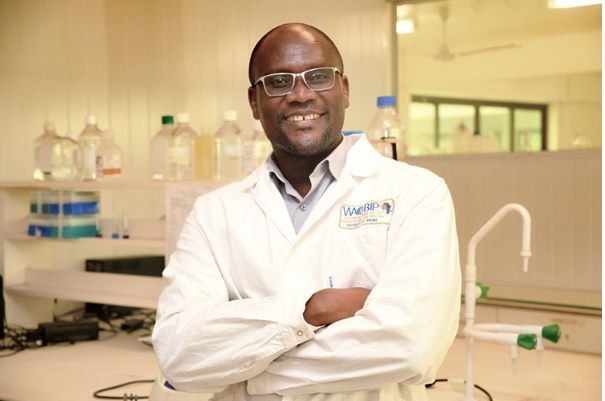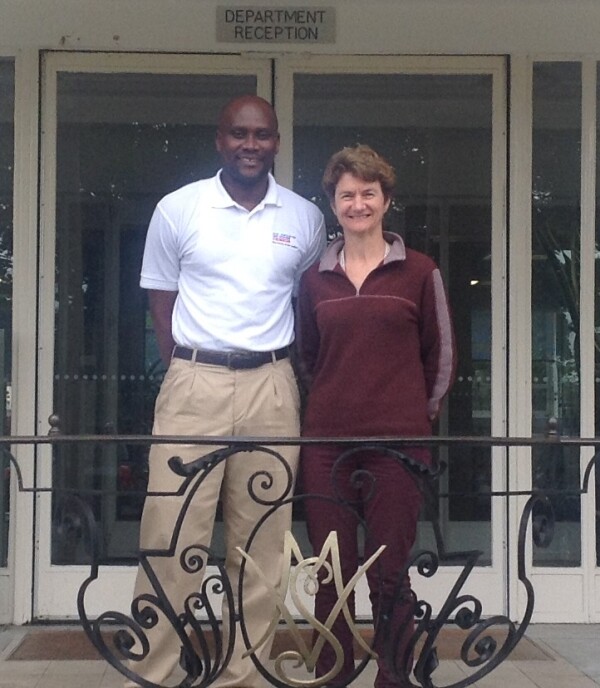Meet Prof. Osbourne Quaye

Professor Osbourne Quaye has collaborated with several scientists at the University of Cambridge over the years. A relationship that begun when he won a CAPREx post-doctoral fellowship. He spoke to Dr Tabitha Mwangi about his experience and motivation.
Did you always want to be scientist?
I was put in a science class by my high school teachers because they thought I was bright. At the undergraduate level, I wanted to do Medicine, but at the time in the University of Ghana, one would have to do Biological Science in the first year, which if you did well, you were invited for an interview. I did well on the program but did not pass my interview that would have enable me to join the Medical School. I was extremely disappointed, but I picked myself up and took up the ‘next best’ option which was Biochemistry.
How did you get into research?
On graduation from my undergraduate programme, I felt my options were either to into industry or academia. I thought academia suited me better, and so after national service, I returned to my Department for a Master’s degree program. I was later employed at the Noguchi Memorial Institute of Medical Research as a Research Assistant. I knew it will take a long time before I would be granted study leave to do a PhD if I remained at Noguchi, so I decided to apply for PhD programs on my own. I got admitted into Georgia State University and resigned from Noguchi to go to the USA for studies. After my PhD in Mechanistic Enzymology (the study of the mechanisms by which enzymes function), I could not get a postdoctoral fellowship in this field and so I took on a job as a Microbiologists at the Centre for Disease Control and Prevention (CDC) in Atlanta, Georgia. I worked there for 3 years and decided to return to Ghana for an academic or research position.
What led you to that decision?
I had always wanted to lead a research group/team; an opportunity I did not see myself getting soon at the CDC. In my opinion, my contributions at CDC were a drop in the ocean, and I felt I would be better fulfilled career-wise in Ghana and as a mentor to the younger generation. I took a big salary cut but I have never regretted my decision to relocate in 2013 and start work at the University of Ghana.
When did you hear about CAPREx?
When I joined the Department of Biochemistry, Cell and Molecular Biology at the University of Ghana, I met people who had applied to CARPEx and were awaiting to go and spend time at the University of Cambridge. Flyers for applying to the program were also widely circulated in the University of Ghana emailing platform, so I decided to give it a try.
How has CAPREx helped grow your career?

Prof Osbourne Quaye and Dr Barbara Blacklaws in Cambridge
I was matched with Barbara Blacklaws and Caroline Trotter, both of the Department of Veterinary Medicine at the University of Cambridge, and I was interested in gastroenteric viruses that are found in domestic animals, mainly pigs and cattle, and their zoonotic potential. I collected samples in Ghana and spent 4 months in Cambridge analysing them. The work eventually got published in a reputable peer-reviewed journal. CAPREx gave me the needed experience, confidence, and training to search for funding to support my research work. I was able to apply for funding with two other colleagues at Cambridge, a Medical Research Council grant with James Wood, and recently, DARPA (Defense Advanced Research Projects Agency) of the United States Department of Defense with Olivier Restif. These are people I would not have met where it not for CAPREx.
It’s been about 9 years since I relocated to the University of Ghana; I have moved from a Lecturer to an Associate Professor, and I am looking forward to becoming a Professor sometime soon. I am also currently the Head of the Department of Biochemistry, Cell and Molecular Biology.
What is your research on and what difference has it made?
My research has generally been in Molecular Virology, and I have worked on various viruses as pathogens including gastroenteric viruses, HIV, hepatitis viruses, yellow fever virus, and SARS-CoV-2 among others. On bat viruses, the focus was to understand the dynamics of filoviruses and henipaviruses in bat roosts in Ghana, and work towards the prevention of spillover events or zoonotic transmission. I am also studying Epstein Barr virus (EBV) to determine population-specific circulating strains that predispose to cancer in sub-Saharan Africa, and to identify diagnostic/prognostic biomarkers for EBV-induced cancers.
Was school smooth-sailing for you and who inspired you in your early years?
My Dad was a banker and my Mum was a teacher, and education was very important to them. I am the second of five children, and my mother in particular took going to school very seriously and made sure we all stayed in school and studied. Growing up as a young boy, there was a time I mentioned to my Mum that I would like to be a footballer, but she would have none of that and said, ‘If you break a leg, that’s the end of your career, but you can use education for as long as you live’. If there is someone who really shaped who I am today, it’s my Mum.
What does the future hold for Osbourne? What is your vision of research and the future?
The excitement of being a mentor to the younger generation never wanes for me. I am therefore inspired to work with and train as many people to become scientists as possible. I have always believed that the more people who get to do scientific research, the closer the world will be towards solving life’s problems/challenges.
I hope to stay in research/academia for the long term. In as much as I do not see myself to be in competition with anybody when it comes to research, I have a vision of contributing significantly/meaningfully to scientific knowledge by working hard to achieve the best I can.

